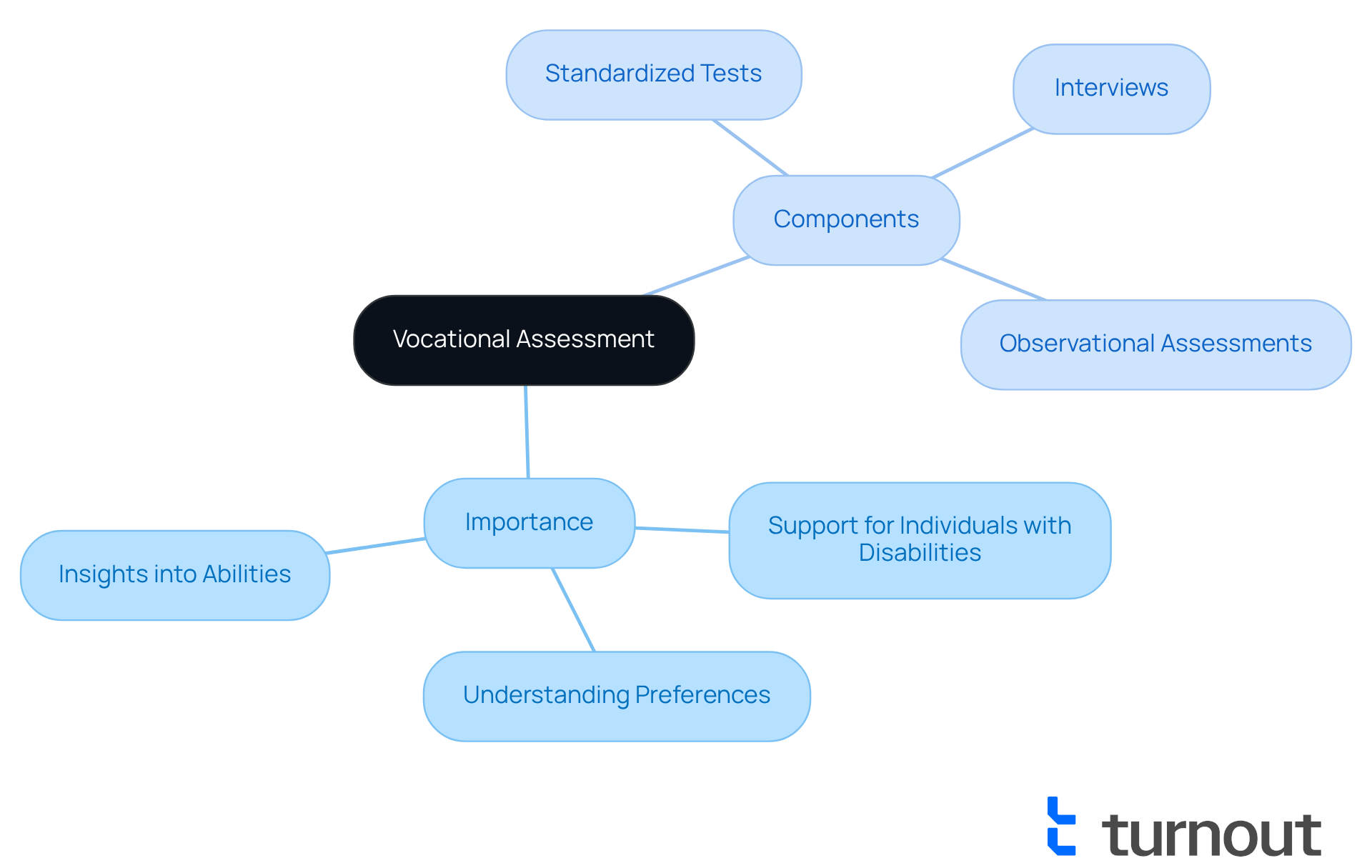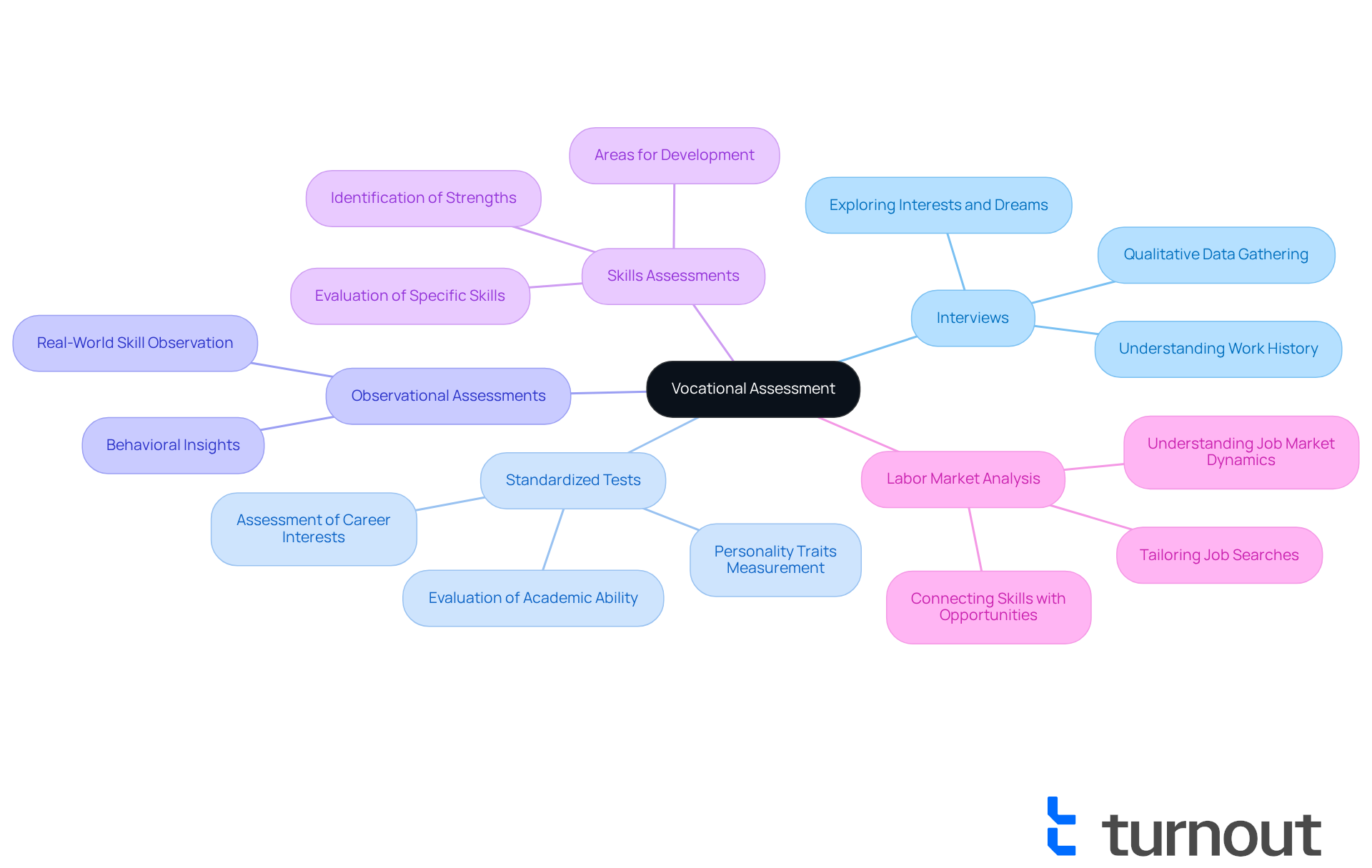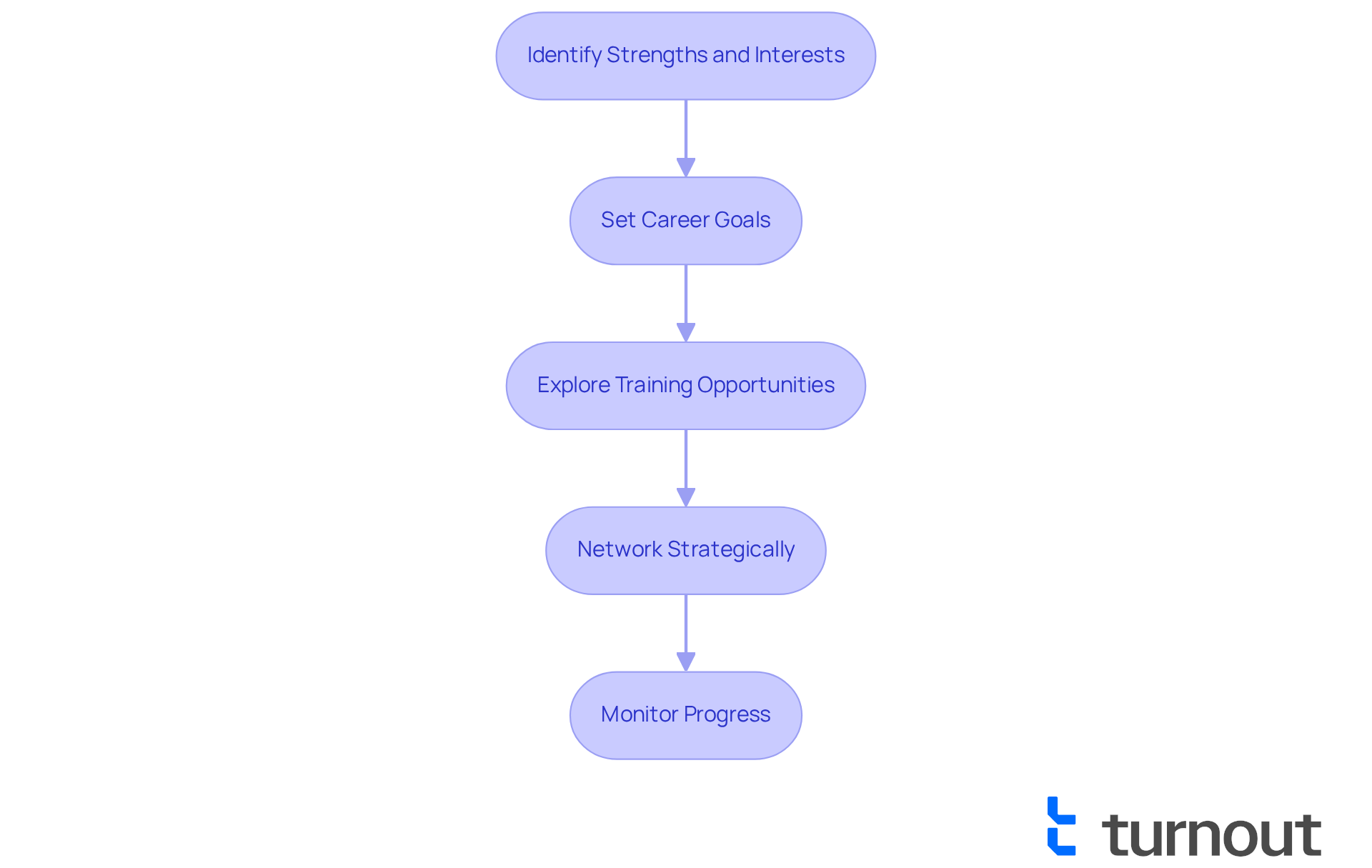Overview
Vocational assessment plays a vital role in guiding individuals like you on your career journey. By evaluating your strengths, interests, and potential job opportunities through methods such as:
- Interviews
- Standardized tests
- Observational assessments
we can help illuminate your path forward. We understand that finding the right employment can be daunting. These assessments not only identify suitable job options but also aim to enhance your confidence and employability. They provide clear insights into your professional potential, aligning it with the job market's needs. Remember, you are not alone in this journey; we’re here to help you every step of the way.
Introduction
Navigating the complexities of career paths can feel overwhelming. We understand that it’s common to be unsure of your strengths and the opportunities available to you. In this journey, vocational assessments emerge as a powerful tool. They offer insights that can illuminate your way forward.
By evaluating your unique abilities, interests, and the dynamics of the job market, these assessments guide you toward fulfilling careers. They also raise important questions about how to best leverage this information for your personal growth and success. What steps can you take to transform assessment results into actionable career strategies? You're not alone in this journey, and we're here to help.
Define Vocational Assessment and Its Importance
A professional evaluation is more than just an analysis; it’s a compassionate approach to recognizing your unique strengths, abilities, interests, and potential job opportunities. This process often includes various elements like standardized tests, interviews, and observational assessments. We understand that navigating your career path can be challenging, which is why vocational assessments are so significant. They provide clear insights into your abilities and preferences through a vocational assessment, which are vital for making informed professional choices.
For individuals with disabilities, these evaluations can be particularly enlightening. They can uncover suitable job opportunities and necessary adjustments, ensuring you find fulfilling work that aligns with your skills and aspirations. Remember, you are not alone in this journey. We're here to help you discover the possibilities that await.

Explore the Components of a Vocational Assessment
Vocational assessment plays a vital role in understanding your career potential, consisting of several key components that work together to provide a comprehensive view of your abilities and aspirations.
-
Interviews are a crucial first step. They allow assessors to gather qualitative data about your work history, interests, and dreams. Through personal conversations, we can uncover the nuances of your experiences and preferences, ensuring your unique story is heard.
-
Next, standardized tests come into play. These assessments evaluate various factors such as academic ability, career interests, and personality traits. They offer quantitative data that can significantly inform your career choices. Studies show that a substantial percentage of vocational assessments include both interviews and standardized tests, ensuring a well-rounded evaluation that aligns with your individual needs.
-
Observational assessments provide another layer of insight. By observing you in work-like environments, we can uncover practical skills and behaviors that may not be apparent through testing alone. This real-world perspective is invaluable in understanding how you might perform in actual job settings.
-
Additionally, skills assessments focus on evaluating specific skills relevant to potential job roles. This targeted approach helps identify your strengths and areas for development, ensuring you are matched with roles that align with your capabilities.
-
Understanding the job market is also essential. Labor Market Analysis (LMA) guides the evaluation process by connecting your personal skills with available opportunities. This ensures that your professional evaluation is not only relevant but actionable.
Together, these elements form a comprehensive view of your professional potential, with a vocational assessment that guides you toward suitable job paths and enhances your prospects for successful employment. Moreover, career evaluations are instrumental in rehabilitation and disability management, helping to identify the best methods for reintegrating you into the workforce.
As Stephen Zeng, Director and Principal Writer at AusRehab, beautifully puts it, "Vocational assessment is a thorough review process that assists individuals in understanding their skills, interests, abilities, and work values to make informed choices regarding their professions." This holistic approach not only helps in identifying suitable employment opportunities but also contributes to developing return-to-work plans, which may include resume development, job placement services, and retraining if necessary.
Ultimately, career evaluations enhance employment rates by connecting job seekers with opportunities that match their abilities and preferences. Remember, you are not alone in this journey; we are here to help you navigate your path to fulfilling employment.

Apply Vocational Assessments to Career Development
Understanding how to utilize the insights gained from vocational assessment can significantly enhance your professional journey. We recognize that navigating your career path can be challenging, and we’re here to help. Here are some key steps to effectively harness these assessments:
- Identify Strengths and Interests: Reflect on the results to discover your strongest skills and interests. This insight can guide your job search and professional decisions.
- Set Career Goals: Based on your evaluation results, establish clear and achievable career goals that resonate with your strengths and interests. This clarity can provide direction in your journey.
- Explore Training Opportunities: If your evaluation highlights areas for improvement, consider pursuing additional training or education. This proactive approach can enhance your employability and confidence.
- Network Strategically: Use your understanding of your career profile to connect with professionals in your desired field. Seeking mentorship and guidance can be invaluable as you progress.
- Monitor Progress: Regularly review your professional evaluation results to track your advancement. This practice allows you to adjust your plans as necessary, ensuring you stay on the right path.
By actively applying the insights from vocational assessment, you can navigate your career with greater confidence and clarity. Remember, you are not alone in this journey; we believe in your potential and are here to support you every step of the way.

Conclusion
Vocational assessment is more than just a tool; it's a lifeline for those navigating their career paths. It offers a thorough evaluation of individual strengths, interests, and potential job opportunities, helping you understand where you truly belong. By utilizing a blend of interviews, standardized tests, observational assessments, and skills evaluations, these assessments paint a complete picture of your professional capabilities. This is especially crucial for individuals with disabilities, as it can reveal suitable job opportunities and necessary adjustments, paving the way for a fulfilling career journey.
We understand that exploring your career options can feel overwhelming. That's why this article emphasizes the importance of both qualitative and quantitative data collection, the role of labor market analysis, and a holistic approach to career evaluations. With the insights gained from these assessments, you can identify your strengths, set achievable career goals, explore training opportunities, and strategically network within your desired fields. This proactive approach not only enhances your employability but also nurtures your confidence in making informed career decisions.
Ultimately, vocational assessments serve as gateways to understanding your personal potential and aligning it with the right career opportunities. Embracing this process can profoundly impact your career success, providing the clarity and direction needed to navigate the complexities of the job market. Remember, you are not alone in this journey. We encourage you to engage with vocational assessments, as they offer essential insights that can lead to fulfilling and successful employment.
Frequently Asked Questions
What is vocational assessment?
Vocational assessment is a professional evaluation process that identifies an individual's unique strengths, abilities, interests, and potential job opportunities through methods such as standardized tests, interviews, and observational assessments.
Why is vocational assessment important?
Vocational assessments are important because they provide clear insights into an individual's abilities and preferences, which are essential for making informed professional choices and navigating career paths effectively.
How can vocational assessments benefit individuals with disabilities?
For individuals with disabilities, vocational assessments can uncover suitable job opportunities and necessary adjustments, helping them find fulfilling work that aligns with their skills and aspirations.




